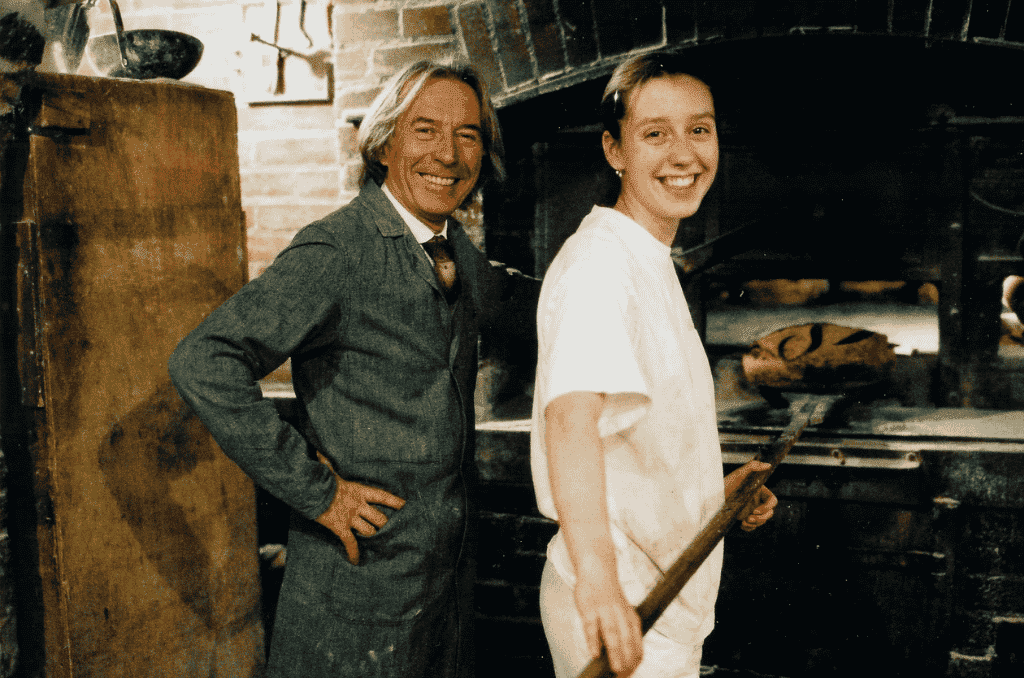While family-run bakeries continue to attract the whole of Paris and even London, Poilâne celebrated its 92nd birthday this year. Here’s a look back at this heritage story, an ode to traditional know-how and the art of eating well.
Our standards have remained unchanged for almost a century. It’s what has made Poilâne bakeries internationally famous: bread made with stone-ground flour and natural sourdough, all baked in an oven heated over a wood fire.
It all began in 1932, when baker Pierre Poilâne opened his first shop in the capital’s 6th arrondissement, at number 8 rue du Cherche-Midi. While the artisan set about spreading the smell of his bread, he also passed on his passion to his children, who continue to perpetuate his legacy.
Passing on the passion for good bread
In this case, Pierre Poilâne sells his Poilâne loaf, a bath ball with a slightly grey crumb weighing almost two kilos. While the white crumb and the baguette were preferred after the Second World War, the baker continued to produce this bread in the traditional way, using flour from wheat ground by a stone rather than a cylinder, which allows the germ of the cereal to be preserved and the bread to retain all its nutrients.
Voir cette publication sur Instagram
Building on his expertise, Pierre supplies the capital’s delicatessens and restaurants. At the same time, he set about passing on his recipes and craftsmanship to his son, Lionel, the youngest of three siblings. Trained by his father, Lionel developed the family business in the 70s and had the brand protected internationally. This structure enabled the company to compete with Lionel’s elder brother Max, who registered the name Max Poilâne in 1976.
A true businessman behind his baker’s hat, Lionel Poilâne built up a solid distribution network, from England to Asia. In the 1980s, he built a factory in Bièvres, near Paris, to boost production of his bread and make several tonnes of Poilâne balls every day.
Voir cette publication sur Instagram
In 2000, the bakery expanded internationally with the opening of a shop in London. Poilâne now has three stores. In 2002, tragedy struck the family: Lionel and his wife Iréna died in a tragic helicopter accident. Their daughter, Apollonia, took over the reins of the company at just 18 years of age.
Apollonia Poilâne, the third generation
Although the young woman grew up between wood-fired ovens and sacks of flour, taking over the family empire was no easy task. All the more so as she was preparing to go to Harvard (where she studied for four years). ‘When I arrived at the head of Poilâne in autumn 2002, I had the basics but, of course, no experience. I had a hands-on experience, with the support of the men and women who run Poilâne on a daily basis, as well as the advice and friends of my parents. I was able to rely on them to exchange ideas, reflect and gain perspective. They were a real force for progress’, the baker and company director told Next Step magazine.
Under his leadership, Poilâne opened a third Parisian shop and a second in London in 2011, followed by a 4th shop in the capital. Today, after a number of changes, the family business has five shops in Paris and one in London. The bread is sold all over the world thanks to a 24-hour delivery service.
Voir cette publication sur Instagram
Apollonia has not only boosted the company’s business. For 10 years, for example, she worked on developing a corn bread, which has been on the market since 2016. She has also opened a café in London, a counter selling delicatessen and sweet treats alongside her shops, an in-house training programme called Pétrin Poilâne Training and launched a course on making bread at home on the MasterClass website.
In 2019, Poilâne’s turnover was €12 million. 20% comes from shop sales and 80% from sales to professionals, retailers and restaurateurs. The group employs 160 journeymen, including around sixty bakers. The Bièvres factory and the boutiques produce 3,000 to 5,000 loaves a day.
Voir cette publication sur Instagram
In 2022, the health crisis and the yellow waistcoat protests weakened the company. Apollonia Poilâne therefore decided to apply to the Paris Commercial Court for a safeguard plan, with the aim of freezing receivables until the company could recover and anticipate future difficulties.
Apollonia is confident about the future and hopes to perpetuate this family empire. “One day, I’d like to be able to pass the business on to a fourth generation”. Several projects are also on the table.
Read also: Le Bal des Débutantes: thirty years of enchantment and nepo babies
Featured photo: © Poilâne















